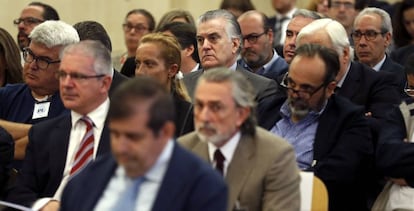Corruption trial threatening to rock Spain’s Popular Party gets underway
Case focuses on huge kickbacks-for-contracts ring allegedly headed up by businessman Francisco Correa

A huge anti-corruption trial got underway in Madrid on Tuesday, with 37 suspects in the dock for their involvement in the so-called Gürtel case, a kickbacks-for-contracts scheme that has plagued the conservative Popular Party (PP) and which has become the biggest known case of party-related corruption in Spain’s democratic history.

Investigators spent five years following the leads of a case involving six regional governments and nearly 200 official suspects, making it the largest pre-trial probe in the history of the High Court, Spain’s central criminal tribunal. Such is the scope of the case that it has been broken up into sections to facilitate the work of investigating magistrates.
On Tuesday, the court will begin looking at a key component of the web of corruption with the activities of businessman Francisco Correa from 1999 to 2005 at the center of proceedings.
The presence of former Popular Party treasurer Luis Bárcenas on the bench is potentially highly damaging
Correa, whose surname loosely translates as belt, or gürtel in German, allegedly headed up the corrupt business dealings of the ring, paying kickbacks to PP politicians in the regions of Madrid and Castilla y León and Valencia, as well as in the town of Estepona, near Málaga.
Anti-corruption judges will now hear oral testimony on those alleged bribes and the ways in which Correa and his associates are thought to have hidden evidence of their existence via a web of letterbox companies and bank accounts in offshore tax havens. Also on the bench is Spain’s former health minister Ana Mato, who is thought to have unknowingly received financial benefit from the kickbacks scheme, while the Popular Party itself is a defendant.
Correa, who faces 125 years and one month in prison, has promised to cooperate with authorities, which could include admitting to some of the accusations leveled at him by prosecutors. However, “Don Vito,” as he is known to his associates, has on other occasions suggested he may confess without ever making good on that promise. To date he has paid €2.2 million in reparations to various civil administrations in Spain using funds from frozen accounts in Switzerland.
Another key feature of the trial – and one that is potentially highly damaging for the PP – is the presence of Luis Bárcenas, former treasurer of the PP from 2008 to 2009, who is accused of financial crimes and who was also found to have amassed a fortune of €48.2 million in Swiss bank accounts, the origin of which remains unclear. His testimony will include the details of a parallel accounting system he allegedly operated on behalf of the party, a slush fund he claims to have used to make illegal under-the-table payments.
Anti-corruption investigators allege Bárcenas appropriated €299,650 from the party slush fund.
In a complicated trial that judges have broken into sections, Gürtel’s activities in Madrid will be the initial focus. Here the regional government of then-Madrid premier Esperanza Aguirre is alleged to have given Correa hundreds of contracts to organize public events. Aguirre’s right-hand man at the time, Alberto López-Viejo, is charged with taking a 10% cut on the cost of these events in exchange for awarding them to Correa’s companies.
Other sections of the trial will focus on Castilla y León, the town council in Majadahonda (Madrid) and Estepona in Malaga.
With nearly 200 official suspects, this is the largest pre-trial probe in the history of Spain's High Court
In the case of Castilla y León, judges will try and ascertain whether Bárcenas, the ex-premier of the region Jesús Merino, and the former mayor of Pozuelo de Alarcón (Madrid) (who is also the ex-husband of former health minister Ana Mato), were in cahoots with Correa. Bárcenas allegedly took €1.28 million in commissions, while the sum is alleged to be €331,737 for Merino.
The Gürtel investigation began in the summer of 2008 after a former PP councilor, José Luis Peñas, filed a complaint with the anti-corruption attorney. For a year, Peñas had been recording conversations with Francisco Correa, in which the latter detailed his own corrupt business dealings and his ties to PP leaders.
For months, former High Court Judge Baltasar Garzón conducted a secret investigation into the allegations and ultimately ordered three ringleaders arrested in February 2009. He also obtained extensive documentary evidence of parallel accounts kept at Correa’s companies showing the payment of illegal commissions to PP politicians. However, he was thrown off the court bench and barred from serving as a judge in 2012 after being convicted of breaching his duties and violating the constitutional rights of several corruption defendants by ordering phone taps of their jailhouse conversations in 2009.
English version by George Mills.
Tu suscripción se está usando en otro dispositivo
¿Quieres añadir otro usuario a tu suscripción?
Si continúas leyendo en este dispositivo, no se podrá leer en el otro.
FlechaTu suscripción se está usando en otro dispositivo y solo puedes acceder a EL PAÍS desde un dispositivo a la vez.
Si quieres compartir tu cuenta, cambia tu suscripción a la modalidad Premium, así podrás añadir otro usuario. Cada uno accederá con su propia cuenta de email, lo que os permitirá personalizar vuestra experiencia en EL PAÍS.
¿Tienes una suscripción de empresa? Accede aquí para contratar más cuentas.
En el caso de no saber quién está usando tu cuenta, te recomendamos cambiar tu contraseña aquí.
Si decides continuar compartiendo tu cuenta, este mensaje se mostrará en tu dispositivo y en el de la otra persona que está usando tu cuenta de forma indefinida, afectando a tu experiencia de lectura. Puedes consultar aquí los términos y condiciones de la suscripción digital.








































